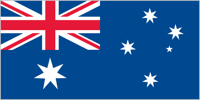Compare
Vatican City
to
Australiato
AustraliaVatican City is a city-state within Italy and the seat of Roman Catholicism
There's really just not enough data on Vatican City to relate it to other countries, so we're just having some fun here.
 With its 22,507,617 people, Australia is the
55th largest country in the world by
population. It is the 6th largest country in the
world by area with 7,741,220 square kilometers.
With its 22,507,617 people, Australia is the
55th largest country in the world by
population. It is the 6th largest country in the
world by area with 7,741,220 square kilometers.
Prehistoric settlers arrived on the continent from Southeast Asia at least 40,000 years before the first Europeans began exploration in the 17th century. No formal territorial claims were made until 1770, when Capt. James COOK took possession of the east coast in the name of Great Britain (all of Australia was claimed as British territory in 1829 with the creation of the colony of Western Australia). Six colonies were created in the late 18th and 19th centuries; they federated and became the Commonwealth of Australia in 1901. The new country took advantage of its natural resources to rapidly develop agricultural and manufacturing industries and to make a major contribution to the Allied effort in World Wars I and II. In recent decades, Australia has become an internationally competitive, advanced market economy due in large part to economic reforms adopted in the 1980s and its location in one of the fastest growing regions of the world economy. Long-term concerns include aging of the population, pressure on infrastructure, and environmental issues such as floods, droughts, and bushfires. Australia is the driest inhabited continent on earth, making it particularly vulnerable to the challenges of climate change. Australia is home to 10 per cent of the world's biodiversity, and a great number of its flora and fauna exist nowhere else in the world. In January 2013, Australia assumed a nonpermanent seat on the UN Security Council for the 2013-14 term.
Check out the recommended reading list below for great sources of information on Australia